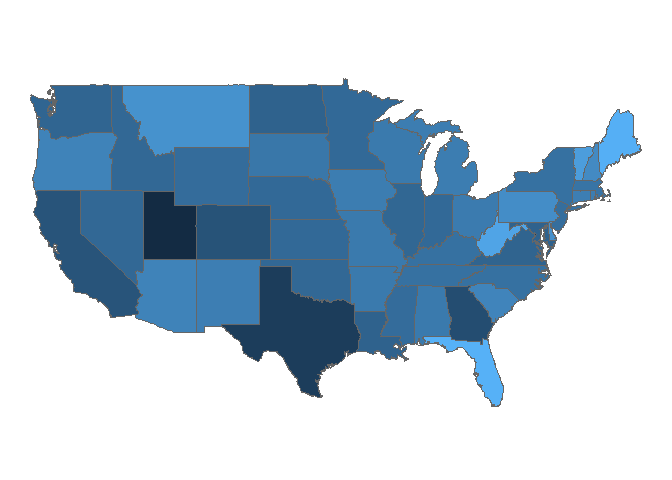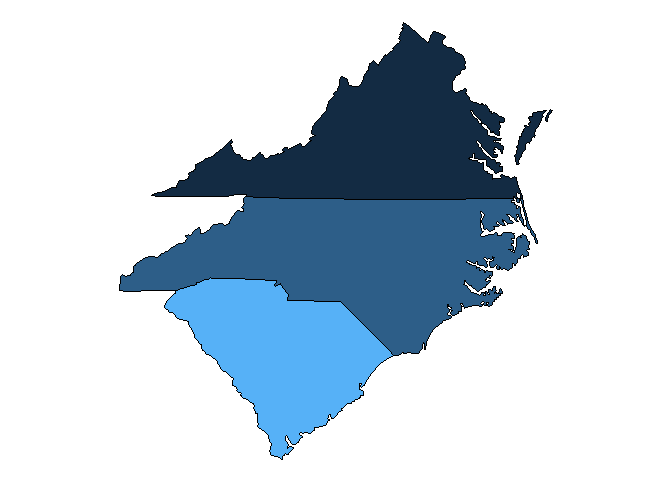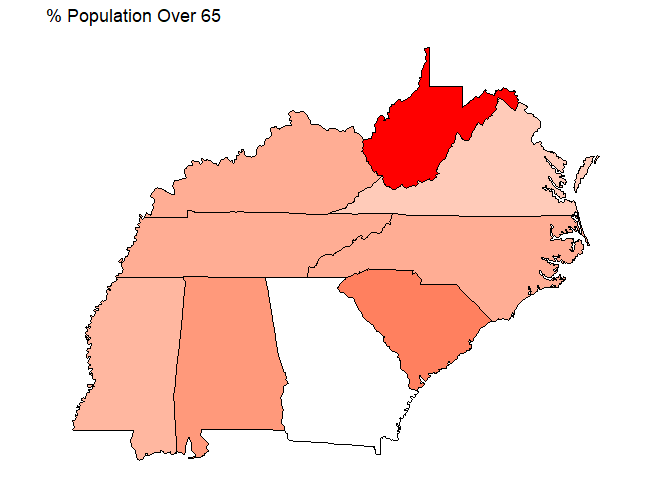cspp is a package designed to allow a user with only basic knowledge
of R to find variables on state politics and policy, create and export
datasets from these variables, subset the datasets by states and years,
create map visualizations, and export citations to common file formats
(e.g., .bib).
The Correlates of State Policy Project compiles more than 2,000 variables across 50 states (+ DC) from 1900-2016. The variables cover 16 broad categories:
- Demographics and Population
- Economic and Fiscal Policy
- Government
- Elections
- Policy Scores and Public Opinion
- Criminal Justice and the Legal System
- Education
- Healthcare and Health Insurance
- Welfare Policy
- Rights and Anti-Discrimination Protections
- Environment
- Drug and Alcohol Policy
- Gun Control
- Labor
- Transportation
- Regulatory Policy
library(devtools)
install_github("correlatesstatepolicy/cspp")The primary functions in this package are get_var_info and
get_cspp_data. The basic workflow for using this package is to 1) find
variables of interest and 2) pull them from the full data into a
dataframe within the R environment. Below is a basic working example.
# Load the package
library(cspp)
# Find variables based on a category
demo_variables <- get_var_info(categories = "demographics")
# Use these variables to get a full or subsetted version of the data
cspp_data <- get_cspp_data(vars = demo_variables$variable,
years = seq(2000, 2010))The get_cspp_data function returns a properly formatted state-year
panel, facilitating regressions and merging based on common state
identifiers.
library(dplyr)
#>
#> Attaching package: 'dplyr'
#> The following objects are masked from 'package:stats':
#>
#> filter, lag
#> The following objects are masked from 'package:base':
#>
#> intersect, setdiff, setequal, union
glimpse(cspp_data[1:15],)
#> Rows: 561
#> Columns: 15
#> $ year <int> 2000, 2000, 2000, 2000, 2000, 2000, 2000, 2000, 2000,...
#> $ st.abb <chr> "AL", "AK", "AZ", "AR", "CA", "CO", "CT", "DE", "DC",...
#> $ stateno <dbl> 1.0, 2.0, 3.0, 4.0, 5.0, 6.0, 7.0, 8.0, 8.5, 9.0, 10....
#> $ state <chr> "Alabama", "Alaska", "Arizona", "Arkansas", "Californ...
#> $ state_fips <int> 1, 2, 4, 5, 6, 8, 9, 10, 11, 12, 13, 15, 16, 17, 18, ...
#> $ state_icpsr <int> 41, 81, 61, 42, 71, 62, 1, 11, 55, 43, 44, 82, 63, 21...
#> $ poptotal <int> 4451687, 627428, 5166810, 2678217, 33998767, 4327788,...
#> $ popdensity <dbl> NA, NA, NA, NA, NA, NA, NA, NA, NA, NA, NA, NA, NA, N...
#> $ popfemale <dbl> 2300000, 302820, 2600000, 1400000, 17000000, 2100000,...
#> $ pctpopfemale <dbl> NA, NA, NA, NA, NA, NA, NA, NA, NA, NA, NA, NA, NA, N...
#> $ popmale <dbl> 2100000, 324112, 2600000, 1300000, 17000000, 2200000,...
#> $ pctpopmale <dbl> NA, NA, NA, NA, NA, NA, NA, NA, NA, NA, NA, NA, NA, N...
#> $ popunder5 <dbl> 295992, 47591, 382386, 181585, 2500000, 297505, 22334...
#> $ pctpopunder14 <dbl> NA, NA, NA, NA, NA, NA, NA, NA, NA, NA, NA, NA, NA, N...
#> $ pop5to17 <dbl> 827430, 143126, 984561, 498784, 6800000, 803290, 6183...Even more generally, you can load the entire set of variables and/or the entire set of data (all 900+ variables) into R through passing these functions without any parameters:
# All variables
all_variables <- get_var_info()
# Full dataset
all_data <- get_cspp_data()
#> Note: the following variables have additional footnotes in the codebook (https://ippsr.msu.edu/sites/default/files/CorrelatesCodebook.pdf):
#> bfh_cpi_multiplier, gov_fin_fy, housing_prices_quar, noofvotes, cartheftrate, carthefttotal, murderrate, murdertotal, propcrimerate, propcrimetotal, raperate, rapetotal, bus_energy_consum, bus_energy_consum_pcGiven the large number of variables in the data, we provide additional
functionality within get_var_info to search for variables based on
strings or categories. For instance, the following searches for pop
and femal within the variable name, returning 31 variables:
# Search for variables by name
get_var_info(var_names = c("pop","femal"))
#> # A tibble: 31 x 6
#> variable years short_desc long_desc sources category
#> <chr> <chr> <chr> <chr> <chr> <chr>
#> 1 poptotal 1900-2~ Population tot~ Total population ~ "U.S. Census B~ demogra~
#> 2 popdensi~ 1975-1~ Population den~ Number of people ~ "http://www.ip~ demogra~
#> 3 popfemale 1994-2~ Female populat~ The number of res~ "CQ Press. 'St~ demogra~
#> 4 pctpopfe~ 2012-2~ Female populat~ Percentage of the~ "U.S. Census B~ demogra~
#> 5 popmale 1994-2~ Male population The number of res~ "CQ Press. 'St~ demogra~
#> 6 pctpopma~ 2012-2~ Male populatio~ Percentage of the~ "U.S. Census B~ demogra~
#> 7 popunder5 1994-2~ Population und~ The number of res~ "CQ Press. 'St~ demogra~
#> 8 pctpopun~ 2013-2~ Population und~ Percentage of the~ "U.S. Census B~ demogra~
#> 9 pop5to17 1994-2~ Population fro~ The number of res~ "CQ Press. 'St~ demogra~
#> 10 pop18to24 1994-2~ Population fro~ The number of res~ "CQ Press. 'St~ demogra~
#> # ... with 21 more rowsA similar line of code using the related_to parameter, instead of
var_name, searches within the name and the description fields,
returning 96 results:
# Search by name and description:
get_var_info(related_to = c("pop", "femal"))
#> # A tibble: 96 x 6
#> variable years short_desc long_desc sources category
#> <chr> <chr> <chr> <chr> <chr> <chr>
#> 1 poptotal 1900-2~ Population tot~ Total population ~ "U.S. Census B~ demogra~
#> 2 popdensi~ 1975-1~ Population den~ Number of people ~ "http://www.ip~ demogra~
#> 3 popfemale 1994-2~ Female populat~ The number of res~ "CQ Press. 'St~ demogra~
#> 4 pctpopfe~ 2012-2~ Female populat~ Percentage of the~ "U.S. Census B~ demogra~
#> 5 popmale 1994-2~ Male population The number of res~ "CQ Press. 'St~ demogra~
#> 6 pctpopma~ 2012-2~ Male populatio~ Percentage of the~ "U.S. Census B~ demogra~
#> 7 popunder5 1994-2~ Population und~ The number of res~ "CQ Press. 'St~ demogra~
#> 8 pctpopun~ 2013-2~ Population und~ Percentage of the~ "U.S. Census B~ demogra~
#> 9 pop5to17 1994-2~ Population fro~ The number of res~ "CQ Press. 'St~ demogra~
#> 10 pop18to24 1994-2~ Population fro~ The number of res~ "CQ Press. 'St~ demogra~
#> # ... with 86 more rowsYou can also return whole categories of variables. The full list of
variable categories is available within the help file for
?get_cspp_data. You can alternatively see the list of categories
through the below snippet of code.
# See variable categories:
unique(get_var_info()$category)
#> [1] "demographics" "economic-fiscal" "environment" "government"
#> [5] "elections" "policy-ideology" "criminal justice" "education"
#> [9] "healthcare" "welfare" "rights" "drug-alcohol"
#> [13] "gun control" "labor" "transportation" "misc. regulation"# Find variables by category:
var_cats <- get_var_info(categories = c("gun control", "labor"))You can then use the variable column in this dataframe to pull data from
get_cspp_data through var_cats$variable, an example of which is
below.
Another option in finding a variable is to load the variables into a dataframe and use RStudio’s filter feature to search:
The function get_cspp_data takes the following parameters, all of
which are optional:
vars- The specific (exact match) variable(s) to pull. Takes a single variable or a vector of variable names.var_category- The category or categories from which to pull. Takes a single category or vector of categories from the 16 listed above.states- Select which states to grab data from. States must be abbreviated and can take a vector or individual state. See?state.abbfor an easy way to load state abbreviations.years- Takes a single year or a vector or sequence of years, such asseq(2001, 2005).output- Choose to write the resulting dataframe straight to a file. Optional outputs includecsv,dta, orrdata.path- If outputting the file, choose where to write it to. If left blank, the file will save to your working directory.
In this example, the resulting dataframe includes the variables
c("sess_length", "hou_majority", "term_length") as well as all
variables in the category demographics for North Carolina, Virgina,
and Georgia from 1994 to 2004.
# Get subsetted data and save to dataframe
data <- get_cspp_data(vars = c("sess_length", "hou_majority", "term_length"),
var_category = "demographics",
states = c("NC", "VA", "GA"),
years = seq(1995, 2004))You can also pass the get_var_info function into the vars parameter
of get_cspp_data, skipping a step:
# Use get_var_info to generate variable vector inline
get_cspp_data(vars = get_var_info(related_to = "concealed carry")$variable,
states = "NC",
years = 1999)
#> year st.abb stateno state state_fips state_icpsr bjourn bprecc
#> 1 1999 NC 33 North Carolina 37 47 2 1Where the two returned variables, bjourn and bprecc, deal with
concealed carry of guns in motor vehicles and whether state laws
pre-empt local laws, respectively.
Each variable in the CSPP data was collected from external sources.
We’ve made it easy to cite the source of each variable you use with
the get_cites function.
This function takes a variable name or vector of variable names (such as
that generated by the get_var_info function) and returns a dataframe
of citations.
# Simple dataframe for one variable
get_cites(var_names = "poptotal")
#> var_name
#> 1 cspp
#> 2 CSPP Dataset
#> 3 poptotal
#> citation
#> 1 U.S. Census Bureau (http://www.census.gov/)\r\nOriginally provided by Stateminder: A data visualization project from Georgetown University. http://stateminder.org/ (no longer accessible online)\r\nFor 2012–2017: U.S. Census Bureau, American Fact Finder: https://www.census.gov/acs/www/data/data-tables-and-tools/american- factfinder/
#> 2 Caleb Lucas and Joshua McCrain (2020). cspp: cspp: A Packge for The Correlates of State Policy Project Data. R package version 0.1.0.
#> 3 Jordan, Marty P. and Matt Grossmann. 2020. The Correlates of State Policy Project v.2.2. East Lansing, MI: Institute for Public Policy and Social Research (IPPSR).
# Using get_var_info to return variable citations
get_cites(var_names = get_var_info(related_to = "concealed carry")$variable)
#> var_name
#> 1 cspp
#> 2 CSPP Dataset
#> 3 bjourn
#> 4 bprecc
#> citation
#> 1 Sorens, Jason, Fait Muedini, and William P. Ruger. 'State and Local Public Policies in 2006: A New Database.' State Politics & Policy Quarterly 8.3 (2008): 309–26.
#> 2 Sorens, Jason, Fait Muedini, and William P. Ruger. 'State and Local Public Policies in 2006: A New Database.' State Politics & Policy Quarterly 8.3 (2008): 309–26.
#> 3 Caleb Lucas and Joshua McCrain (2020). cspp: cspp: A Packge for The Correlates of State Policy Project Data. R package version 0.1.0.
#> 4 Jordan, Marty P. and Matt Grossmann. 2020. The Correlates of State Policy Project v.2.2. East Lansing, MI: Institute for Public Policy and Social Research (IPPSR).There is also an option to output the citations to a .bib, .csv or .txt file:
get_cites(var_names = "poptotal",
write_out = TRUE,
file_path = "~/path/to/file.csv",
format = "csv")The generate_map function uses the CSPP data to generate US maps with
states filled in based on the value of a given variable (also called
choropleths). This function returns a ggplot object so it is highly
customizable. The optional parameters are:
cspp_data- A dataframe ideally generated by theget_cspp_datafunction. Any dataframe will work as long as it has the columnsst.abb,year, and any additional column from which to fill in the map.var_name- The specific variable to use to fill in the map. If left blank, it will take the first column afteryearandst.abb.average_years- Default is FALSE. If set to TRUE, this returns a map that averages over all of the years per state in the dataframe. So if there are multiple years of population per state, it plots the average population per state in the panel.drop_NA_states- By default, the function keeps states that are missing data, resulting in them being filled in as gray. If this is set to TRUE, the states are dropped. See the example below.poly_args- A list of arguments that determine the aesthetics of state shapes. Seeggplot2::geom_polygonfor options.
Note: This function will attempt to plot any variable type; however, plotting character or factor values on a map will likely result in a hard to interpret graph.
library(ggplot2) # optional, but needed to remove legend
# Generates a map of the percentage of the population over 65
generate_map(get_cspp_data(var_category = "demographics"),
var_name = "pctpopover65") +
theme(legend.position = "none")In this example, since the dataframe passed is generated by
get_cspp_data(var_category = "demographics") and contains all years
for all states in the data, the function by default returns the value of
the most recent year without missing data.
If you set drop_NA_states to TRUE, and pass the function a dataframe
containing only certain states, it only plots those states:
library(dplyr)
generate_map(get_cspp_data(var_category = "demographics") %>%
dplyr::filter(st.abb %in% c("NC", "VA", "SC")),
var_name = "pctpopover65",
poly_args = list(color = "black"),
drop_NA_states = TRUE) +
theme(legend.position = "none")Since this function returns a ggplot object, you can customize it
endlessly:
generate_map(get_cspp_data(var_category = "demographics") %>%
dplyr::filter(st.abb %in% c("NC", "VA", "SC", "TN", "GA", "WV", "MS", "AL", "KY")),
var_name = "pctpopover65",
poly_args = list(color = "black"),
drop_NA_states = TRUE) +
scale_fill_gradient(low = "white", high = "red") +
theme(legend.position = "none") +
ggtitle("% Population Over 65")The function get_network_data returns a dataset from the CSPP state
networks data
consisting of 120 variables. The data is structured as state dyads (an
edge list).
# Returns dataframe of state dyads
head(get_network_data())
#> # A tibble: 6 x 120
#> State1 State2 st.abb2 st.abb1 dyadid S1region S2region S1division S2division
#> <chr> <chr> <chr> <chr> <chr> <chr> <chr> <chr> <chr>
#> 1 Alaba~ Alaska AK AL AL-AK South West East Sout~ Pacific
#> 2 Alaba~ Arizo~ AZ AL AL-AZ South West East Sout~ Mountain
#> 3 Alaba~ Arkan~ AR AL AL-AR South South East Sout~ West Sout~
#> 4 Alaba~ Calif~ CA AL AL-CA South West East Sout~ Pacific
#> 5 Alaba~ Color~ CO AL AL-CO South West East Sout~ Mountain
#> 6 Alaba~ Conne~ CT AL AL-CT South Northea~ East Sout~ New Engla~
#> # ... with 111 more variables: Border <dbl>, Distance <dbl>, State1_Lat <dbl>,
#> # State1_Long <dbl>, State2_Lat <dbl>, State2_Long <dbl>,
#> # ACS_Migration <dbl>, PopDif <dbl>, State1_Pop <dbl>, State2_Pop <dbl>,
#> # IncomingFlights <dbl>, IRS_migration <dbl>, Income <dbl>,
#> # IRS_migration_2010 <dbl>, Income_2010 <dbl>, Imports <dbl>, GSPDif <dbl>,
#> # S1GSP <dbl>, S2GSP <dbl>, DemDif <dbl>, S1AvgDem <dbl>, S2AvgDem <dbl>,
#> # S1SenDemProp <dbl>, S1HSDemProp <dbl>, S2SenDemProp <dbl>,
#> # S2HSDemProp <dbl>, IdeologyDif <dbl>, PIDDif <dbl>, S1Ideology <dbl>,
#> # S1PID <dbl>, S2Ideology <dbl>, S2PID <dbl>, policy_diffusion_tie <dbl>,
#> # policy_diffusion_2015 <dbl>, policy_diffusion_2000.2015 <dbl>,
#> # LibDif <dbl>, ELibDif <dbl>, SLibDif <dbl>, S1EconomicLiberalism <dbl>,
#> # S1SocialLiberalism <dbl>, S2EconomicLiberalism <dbl>,
#> # S2SocialLiberalism <dbl>, MassSocLibDif <dbl>, MassEconLibDif <dbl>,
#> # PolSocLibDif <dbl>, PolEconLibDif <dbl>, State1PolSocLib <dbl>,
#> # State1PolEconLib <dbl>, State1MassSocLib <dbl>, State1MassEconLib <dbl>,
#> # State2PolSocLib <dbl>, State2PolEconLib <dbl>, State2MassSocLib <dbl>,
#> # State2MassEconLib <dbl>, perceived_similarity <dbl>, RaceDif <dbl>,
#> # LatinoDif <dbl>, WhiteDif <dbl>, BlackDif <dbl>, AsianDif <dbl>,
#> # NativeDif <dbl>, S1Latino <dbl>, S1White <dbl>, S1Black <dbl>,
#> # S1Asian <dbl>, S1Native <dbl>, S2Latino <dbl>, S2White <dbl>,
#> # S2Black <dbl>, S2Asian <dbl>, S2Native <dbl>, ReligDif <dbl>,
#> # ChristianDif <dbl>, EvangelicalDif <dbl>, MainlineDif <dbl>, BPDif <dbl>,
#> # CatholicDif <dbl>, MormonDif <dbl>, JewishDif <dbl>, MuslimDif <dbl>,
#> # BuddhistDif <dbl>, HinduDif <dbl>, NonesDif <dbl>, NPDif <dbl>,
#> # ReligiosityDif <dbl>, S1Christian <dbl>, S1Evangelical <dbl>,
#> # S1Mainline <dbl>, S1BlackProt <dbl>, S1Catholic <dbl>, S1Mormon <dbl>,
#> # S1Jewish <dbl>, S1Muslim <dbl>, S1Buddhist <dbl>, S1Hindu <dbl>,
#> # S1Nones <dbl>, S1NothingParticular <dbl>, S1HighlyReligious <dbl>,
#> # S2Christian <dbl>, S2Evangelical <dbl>, ...The function has two optional parameters category and merge_data. If
a category or string of categories is specified, it returns variables
only in that category (see the data documentation in the link above).
Category options are “Distance Travel Migration”, “Economic”,
“Political”, “Policy”, “Demographic”.
network.df <- get_network_data(category = c("Economic", "Political"))
names(network.df)
#> [1] "State1" "State2" "st.abb2"
#> [4] "st.abb1" "dyadid" "IRS_migration"
#> [7] "Income" "IRS_migration_2010" "Income_2010"
#> [10] "Imports" "GSPDif" "S1GSP"
#> [13] "S2GSP" "DemDif" "S1AvgDem"
#> [16] "S2AvgDem" "S1SenDemProp" "S1HSDemProp"
#> [19] "S2SenDemProp" "S2HSDemProp" "IdeologyDif"
#> [22] "PIDDif" "S1Ideology" "S1PID"
#> [25] "S2Ideology" "S2PID"merge_data simplifies merging in data from the get_cspp_data
function. The object passed to merge_data must be a dataframe with a
variable named st.abb, or a dataframe generated by get_cspp_data. If
the dataframe passed to this parameter has more than one observation per
state (a panel) then this function averages over all values per state
prior to merging.
cspp_data <- get_cspp_data(vars = c("sess_length", "hou_majority"), years = seq(1999, 2000))
network.df <- get_network_data(category = "Distance Travel Migration",
merge_data = cspp_data)
#> Warning in get_network_data(category = "Distance Travel Migration", merge_data
#> = cspp_data): There are multiple observations per state in the `data` dataframe.
#> Creating one observation per state (dplyr::summarize()) prior to merging...
names(network.df)
#> [1] "State1" "State2" "st.abb2" "st.abb1"
#> [5] "dyadid" "S1region" "S2region" "S1division"
#> [9] "S2division" "Border" "Distance" "State1_Lat"
#> [13] "State1_Long" "State2_Lat" "State2_Long" "ACS_Migration"
#> [17] "PopDif" "State1_Pop" "State2_Pop" "IncomingFlights"
#> [21] "sess_length" "hou_majority"
library(dplyr)
head(cspp_data %>% arrange(st.abb))
#> year st.abb stateno state state_fips state_icpsr sess_length hou_majority
#> 1 1999 AK 2 Alaska 2 81 167.56 0.752
#> 2 2000 AK 2 Alaska 2 81 NA 0.752
#> 3 1999 AL 1 Alabama 1 41 60.00 -0.129
#> 4 2000 AL 1 Alabama 1 41 NA -0.115
#> 5 1999 AR 4 Arkansas 5 42 63.19 0.118
#> 6 2000 AR 4 Arkansas 5 42 NA 0.118
# the merged value of Alaska's hou_majority value will be mean(c(-0.129, -0.115))Caleb Lucas and Joshua McCrain (2020). cspp: A Package for The Correlates of State Policy Project Data. R package version 0.1.0.
Caleb Lucas - Ph.D. Candidate, Michigan
State University (Twitter)
Josh McCrain - Post-doc, IPPSR, Michigan
State University (Twitter)



